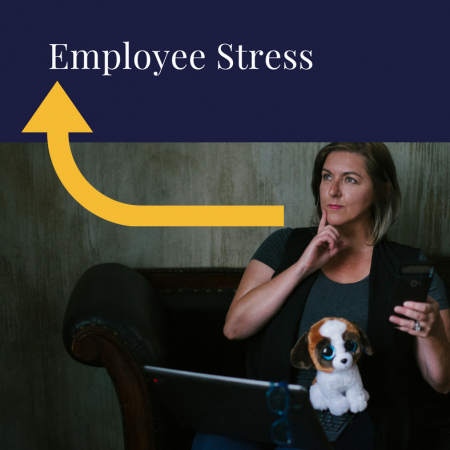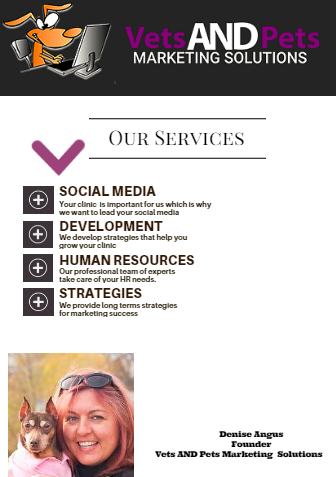Employee Stress In Your Veterinary Practice

Employee stress in your veterinary practice is a very real thing. My work day typically begins the same way either at my hub veterinary practice or when spending my day in client practices. I stop to grab a coffee for myself and my colleagues along with a pack of assorted Tim Bits.
My first chat is always with the clinic receptionists because they’re the eyes and ears of everything happening on the floor. I head to treatment to chat with the Techs and Assistants and get the low down on admitted patients. A quick chat with the Veterinarian on duty to see if all is well in their world. Then I head to my work space, check some emails, return some calls and like clockwork, all hell seems to break loose at the same time.
An admitted pet crashes, a tussle at a dog park brings in a dog with blood gushing everywhere, a hit by car is rushed in, a client is irate about the cost of their bill although a treatment plan was signed, the ultrasound won’t turn on and Antech Diagnostics is waiting for a rush pickup and that dog will not give a urine sample no matter how many trips around the block were taken.
Veterinary practice staff are overexposed to stress each and every day. Workplace stress has never been higher.
6 tips to make your workday a stress-free one:
Question Your Thoughts
I know you’d like to think you’re always right but you’re not, especially when it comes to your thoughts! People seem to hang on to negative thought far longer than they should. If you spend your workday allowing negative thoughts to consume your day, I promise you it’s going to be a long hard emotional day. As an example, in veterinary medicine, we deal with pet loss often. I think it’s one of the most difficult parts of our job. Feeling empathy and compassion for the loss of a patient is one thing, but you can’t hang on to that emotion all day. Feel it, acknowledge it, and you must try to let it go. The power of emotions are huge. Negative emotions not only have the power to make you feel bad but can affect your physical health as well.
Breathe and Release
Focus on your stressful situation. Take a long deep breath in through your nose and hold. Expel the air out of your mouth as you envision all that stress leaving you. Repeat 3 times and you’ll be surprised how your stress level has dissipated.
Take 5, 15 or 30
Of course, you can’t take a timeout during an emergency, surgery or an overflowing reception area, but if you’re feeling especially stressful, see if you can take a 5-minute break and go for a brisk walk. Sometimes a change of scenery, fresh air, and a bit of vigorous exercise can calm your mind back to a place that you’re better equipped to deal with the situation bothering you. Your breaks are also a crucial must in the veterinary world. It seems to have become the norm for staff to skip breaks because the clinic is just too busy for you to step away. Breaks are your legal right and you need them. Taking a break—even for 15 to 20 minutes—is a proven way to sustain concentration and energy levels throughout the day.
The Pursuit of Happiness
Create a space in your clinic where before everyone leaves at the end of their shift they leave a dated note about “one good thing that happened today.” It can be as simple as “I was able to finish my coffee without having to reheat it” to “We saved a pet’s life in surgery.”
Lead By Example
A crucial step in lowering workplace stress is for leaders to put a lid on their own emotions. Don’t let your bad day put your staff on high alert. Communicate and check in with your team daily. Be approachable. Open and honest communication is a two-way street and the more you communicate with your employees letting them know you’re there for them, the more likely they are to share their concerns, ideas and thoughts making for much stronger working relationships and a healthier overall clinic culture.
Get Serious About Belly Laughs
Often we take ourselves far too seriously in veterinary medicine and seem to confuse solemnity as never sharing a laugh. Having fun seems to be perceived as inappropriate behavior in a clinic setting, but that’s the furthest from the truth. Laughter opens the mind and releases stress. It makes us more receptive to our surroundings. Who feels stress after sharing a belly laugh with colleagues? A hearty belly laugh can lower your blood pressure, exercise your lungs, pump more oxygen into the bloodstream, and activates endorphins that make people feel awesome. As human beings, we are given the ability to communicate with our emotions, and that includes laughing in the workplace.
If you feel you are in crisis, The Canadian Veterinary Medical Association is committed to supporting the well-being of veterinarians and have compiled a list of resources for anyone needing help in Canada.
If you are in a crisis situation now, call your local emergency service or 9-1-1.
Contact me to discuss marketing strategies to boost your client retenton and sales.
Don’t miss a single blog post. Have it sent to your inbox and receive a bonus just for joining.

